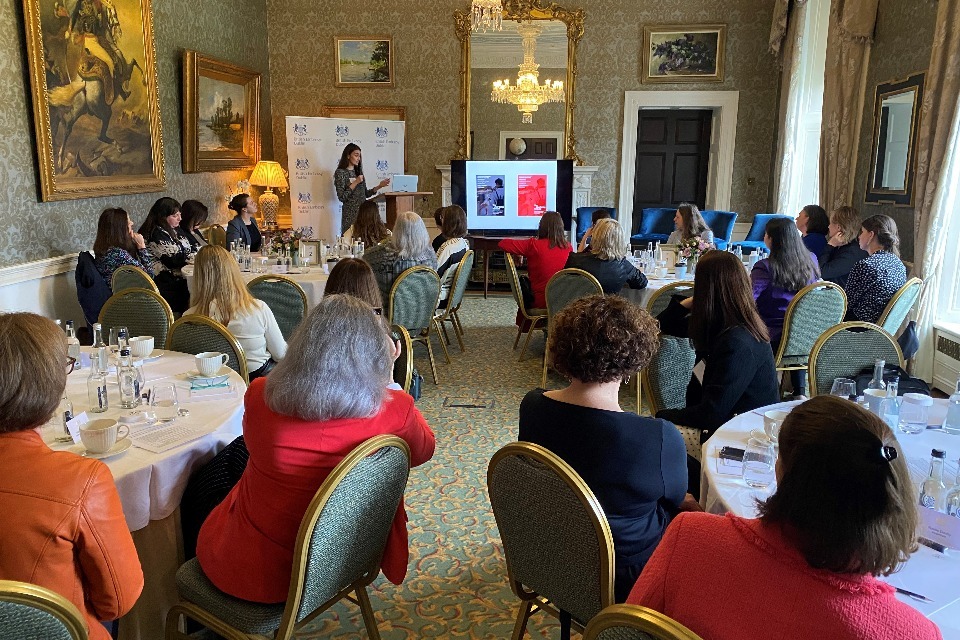The event ‘Information and Misinformation through the Ages: Past, Present and Future’ brought together scientists, academics and policy makers from Ireland and the UK to celebrate women who work in artificial intelligence.
Speakers included:
- Dr Niamh Wycherley, Medieval Irish Historian from Maynooth University, who spoke about her work as a historian and St Brigid, and how misinformation and technology affect her work.
- Dr Erin Young, Research Fellow in Public Policy from the UK’s National Institute for data science and artificial intelligence – the Alan Turing Institute, who spoke about diversity and exploring gender gaps and inequalities in data and AI.
- Laura Ellis, Head of Technology Forecasting at the BBC’s R&D division, who spoke her role as a technologist and journalist with a focus on emerging technology, machine learning, disinformation and data, and how the BBC is best placed to take advantage of emerging technology today and in the future.
Speaking about the event the British Deputy Ambassador to Ireland, Elin Burns said:
Today we are joined by women who are scientists, researchers and policy makers who work in the area of AI across the UK and Ireland. Events such as these, where women can share, connect and celebrate their work are so important as a significant gender gap still persists at all levels of STEM disciplines.
We chose the wonderful location of Kildare to celebrate women and girls in science because of Brigid and the 1500th anniversary of her death. As Ireland’s only female patron saint, and an inspirational leader of her time, we thought it was apt to celebrate a visionary of the past with visionaries of the present.
On the theme of AI; we are in the midst of a technological revolution that will fundamentally alter the way we live, work, and relate to one another. Artificial Intelligence promises to further transform nearly every aspect of our economy and society. The opportunities are transformational – advancing drug discovery, making transport safer and cleaner, improving public services, speeding up and improving diagnosis and treatment of diseases like cancer and much more. To seize the opportunities however, we must manage the risks, which is why the Prime Minister organised the first Global Summit on AI Safety last November.
Speaking at the event, Dr Niamh Wycherley said:
At today’s event I have been exploring fake news and perpetuated myths around St Brigid of Kildare. As a medieval historian, I am interested in how the reliance on inherently biased sources, and a lack of knowledge around new tools, has often led to the perpetuation of false narratives in Irish history, especially in relation to women.
Speaking about her work in the Alan Turing Institute, Erin Young said:
Our Women in Data Science and AI project sits in the Public Policy programme at The Alan Turing Institute. We conduct data science and social science research to inform policy measures promoting responsible and inclusive innovation, and increasing equity in AI, in the UK and globally. We work alongside government policy makers and the private sector, offering actionable insights and recommendations to tackle the multifaceted ethical, economic and governance-related issues stemming from inequalities in AI. The focus of today’s important event celebrating women who work in AI and science across Ireland and the UK, while drawing attention towards AI- driven misinformation and disinformation, is at the heart of some of the work we do in the project and at the Institute.
Guests also heard from panellists, chaired by Dr Susan Leavy, Assistant Professor AI Ethics, University College Dublin:
- Dr Georgiana Ifrim, Associate Professor at the School of Computer Science, University College Dublin; Director ML Labs and Dublin City Lead for Women in AI.
- Imogen Schon, Deputy Director UK AI Safety Institute, Dept for Science Innovation and Tech.
- Nic Flanagan, Artist, Curatorial Practitioner, Researcher and PhD student, Munster Technological University.


